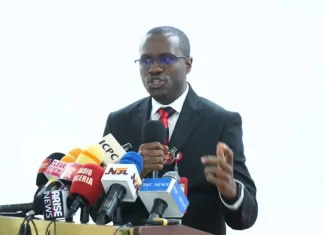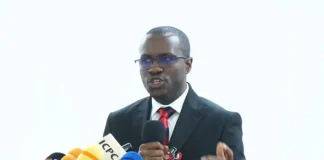By Professor Yemi Ebenezer Akinkoye and Idris Muhammed Abdullahi
The World Bank recently projected that Nigeria and other Sub-Saharan African nations will pay over $20 billion in interest alone to external creditors in 2025. While sovereign debt can be a legitimate tool for economic development, the surging cost of debt servicing in fragile economies exposes deeper systemic vulnerabilities. This paper situates the rising debt burden within the broader context of Illicit Financial Flows (IFFs), arguing that debt-related leakages, misinvoicing, and virtual asset transfers represent a new and evolving form of IFF. These developments demand urgent policy innovation, enhanced international cooperation, and structural reforms to protect Sub-Saharan Africa’s fiscal sovereignty and sustainable development trajectory.
Debt: A Double-Edged Sword
Debt has historically been a double-edged sword for developing economies. Properly managed, it accelerates growth; mismanaged, it entrenches dependency and fiscal fragility. The World Bank’s recent warning that Sub-Saharan African nations will expend over $20 billion in interest payments in 2025 highlights a looming fiscal crisis. While much debate focuses on debt sustainability, less attention has been paid to the nexus between debt servicing and evolving patterns of illicit financial flows. This paper examines how rising debt burdens are increasingly intertwined with sophisticated IFF mechanisms, posing a severe threat to Africa’s economic ambitions.
Illicit Financial Flows: Traditional Context
Historically, IFFs in Sub-Saharan Africa have been understood through three primary conduits:
-
Trade misinvoicing: Deliberate misstatement of import/export values to illicitly shift profits.
-
Corruption: The diversion of public funds by politically exposed persons (PEPs).
-
Criminal activities: Including smuggling, trafficking, and organized crime.
According to Global Financial Integrity (GFI), Africa loses approximately $88.6 billion annually to IFFs, significantly undermining domestic resource mobilization and economic sovereignty.
However, as global financial systems evolve, so do the methods of illicit outflows — particularly under the veneer of legitimate transactions such as debt repayments.
Debt Servicing and Illicit Financial Flows: An Emerging Nexus
1. Debt-Fueled IFFs
Reports by UNCTAD and the African Union’s High-Level Panel on IFFs (chaired by Thabo Mbeki) have shown how public borrowing can itself become a vehicle for illicit outflows through:
-
Contract over-invoicing: Inflated external borrowing ostensibly for infrastructure, but siphoned off through overpriced contracts.
-
Phantom projects: Loans secured for projects that are either non-existent or grossly under-delivered.
Consequently, a portion of what is officially recorded as “debt servicing” effectively constitutes repayment for capital illicitly extracted through IFF mechanisms.
2. Emergence of “Odious Debt” and Hidden IFFs
Loans secured without genuine public benefit, often captured by elites, fit the legal definition of “odious debts.” Repayment of such debts drains national wealth to enrich private creditors while depleting critical development resources.
Because these transactions are recorded as formal financial flows, they are masked within legitimate economic data — representing a new form of legitimized illicit outflows.
New Forms of IFFs in the Era of Debt Vulnerability
Technological innovation and deregulation have birthed new modalities for illicit financial flows:
1. Cryptocurrency and Virtual Assets
Sub-Saharan Africa now leads globally in peer-to-peer cryptocurrency usage. While reflecting innovation, it also enables:
-
The transfer of illicitly acquired public funds through decentralized finance systems.
-
Evasion of capital controls and tax obligations.
Debt proceeds can thus vanish into anonymized digital wallets beyond the reach of traditional financial regulators.
2. Complex Financial Instruments
The proliferation of opaque Special Purpose Vehicles (SPVs), shell companies, and complex derivatives allows for:
-
Masking of sovereign debt ownership structures.
-
Laundering and offshoring of illicit gains beyond regulatory oversight.
Thus, IFFs now involve intricate financial engineering embedded within otherwise legitimate investment frameworks.
3. Climate and Green Finance Abuse
The surge in green finance initiatives (e.g., green bonds) presents a fresh frontier for IFFs. Without rigorous verification mechanisms, funds intended for environmental sustainability can be diverted through corruption, mirroring older debt-fueled IFF patterns under a new label.
Nigeria’s Experience: A Microcosm of the Regional Challenge
Nigeria’s fiscal position epitomizes the dangers discussed:
-
The Ministry of Finance reports that Nigeria’s debt servicing-to-revenue ratio exceeds 90% — a classic sign of fiscal distress.
-
The 2023 Fiscal Policy Framework revealed that servicing debts consumed over 96% of national revenues at a point.
-
Audit reports continually expose inflated contracts and non-performing loans, signaling systemic vulnerabilities to debt-driven IFFs.
-
Cryptocurrency outflows — estimated at over $60 billion between 2020 and 2023 — further illustrate the digital dimension of Nigeria’s IFF challenges.
Nigeria’s case is emblematic of how rising debt obligations and weak anti-IFF architecture can cripple national economic aspirations.
Global Responsibility and the Role of International Financial Institutions
While domestic governance failures are critical, external creditors — including private lenders and commercial banks — have often enabled and profited from illicit flows. Institutions such as the World Bank, IMF, and Financial Action Task Force (FATF) must:
-
Strengthen debt transparency initiatives.
-
Enforce beneficial ownership disclosures for sovereign debt arrangements.
-
Support mandatory country-by-country reporting to uncover hidden financial linkages.
-
Conduct “public benefit” tests before endorsing sovereign loans to prevent odious or predatory lending practices.
There is a clear moral imperative for international financial institutions to curb the complicity of enabling jurisdictions and financial actors.
Conclusion and Recommendations
The projected $20 billion interest burden for 2025 must be treated as an urgent wake-up call. Without decisive reforms, Sub-Saharan Africa risks perpetuating a vicious cycle where public debt finances private wealth extraction abroad.
We recommend:
-
Independent Debt Audits: Governments must audit existing external debts to identify and contest odious or fraud-laden loans.
-
Strengthened IFF Controls: Governments must reinforce anti-IFF mechanisms around debt disbursement, procurement, and repayment processes.
-
Digital Asset Regulation: Close regulatory loopholes that allow IFFs via cryptocurrencies and blockchain transactions.
-
Capacity Building: Equip tax authorities, anti-corruption agencies, and financial intelligence units to detect and dismantle sophisticated IFF structures.
-
Enhanced International Cooperation: Africa must champion stronger global norms against IFF-enabling jurisdictions and hold both public and private sector actors accountable.
In today’s hyper-globalized economy, where the boundaries between licit and illicit finance are increasingly blurred, the fight against illicit financial flows must evolve just as rapidly as the threats themselves.
References
-
World Bank (2024). Africa’s Pulse: Economic Growth and Debt Dynamics.
-
Global Financial Integrity (2023). Illicit Financial Flows to and from Developing Countries: 2008-2021.
-
United Nations Economic Commission for Africa (UNECA) (2015). Track It, Stop It, Get It: Report of the High-Level Panel on Illicit Financial Flows.
-
International Monetary Fund (2023). Debt Sustainability Analysis for Low-Income Countries.
-
Financial Action Task Force (2022). Virtual Assets Red Flag Indicators of Money Laundering and Terrorist Financing.
-
UNCTAD (2023). Economic Development in Africa Report: Debt Dynamics and IFFs.
Co-Authored by:
-
Professor Yemi Ebenezer Akinkoye, Professor of Accounting, Obafemi Awolowo University, Nigeria.
-
Idris Muhammed Abdullahi, MSc (Forensic Investigations), MPA (Public Administration),
Head – Anti-Graft & Law Enforcement Liaison, Federal Inland Revenue Service (FIRS),
Global Specialist on Anti-Corruption, Illicit Financial Flows (IFFs), AML/CFT, Asset Recovery, and Tax Evasion.
Share your story or advertise with us: Whatsapp: +2347068606071 Email: info@newspotng.com

















